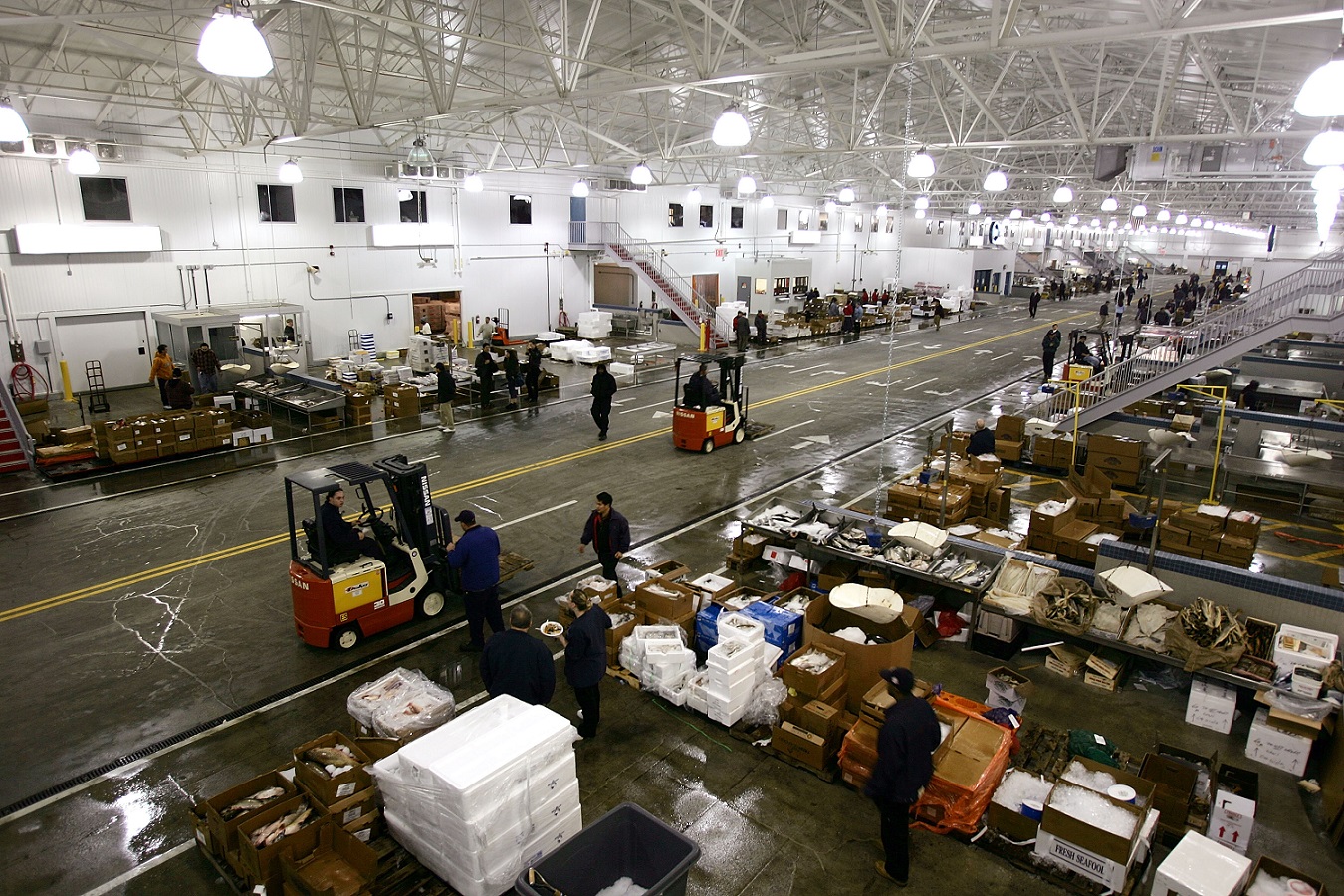
Workers sort fish at the New Fulton Fish Market, one of three cooperative markets at the Hunts Point Food Distribution Center in the Bronx. (Spencer Platt/Getty Images)
The neighborhood of Hunts Point sits on a peninsula poking out of the east side of the South Bronx. Not to be confused with Hunters Point in Queens, the Bronx neighborhood is surrounded by the Bronx and East rivers and the Bruckner Expressway. Cut off from much of the borough and the city, Hunts Point is home to a mix of residential homes and a busy industrial hub that affects New Yorkers every day. Chances are that the items at your local grocery store arrived in NYC through the massive Hunts Point Food Distribution Center, which feeds a huge portion of the entire region.
Hunts Point History
Prior to the arrival of Europeans, the area around Hunts Point belonged to the Weckquaesgeek tribe of Native Americans, who called the area Quinnahung, or “planting neck.” In 1670, after European settlers purchased the land, the area was renamed Hunts Point, after early settler Thomas Hunt.
George Fox, founder of the Quakers, is rumored to have preached in the area. His son, William H. Fox, and Fox’s wife, Charlotte Leggett, owned much of Hunts Point, and the Hunts Point Terminal Market now stands on a portion of their land. Fox and Legget’s son-in-law, H.D. Tiffany, was a member of the renowned jeweler family Tiffany & Co.
The neighborhood is also home to the notable American Banknote building. Built in 1911, this factory produced coins, paper money, foreign stock certificates and travelers checks. It was designated as a landmark in 2008, and the former factory is now home to civic and commercial offices.
Article continues below
Hunts Point Market: The Largest Food Distributor in the World
The Hunts Point Food Distribution Center, commonly referred to as the Hunts Point Market, is the largest food distribution center in the world. It contains three independent cooperative markets: the Hunts Point Cooperative Meat Market, the Hunts Point Terminal Produce Market, and the New Fulton Fish Market. Each of these markets houses a number of private vendors who sublet space.
The produce market is the largest of the three. It sits on 113 acres, with more than 1 million square feet of space inside its four main aisles, with 35 vendors total.
Open since 1967, the Hunts Point Market supplies food to 23,000 restaurants, and handles a whopping 210 million packages of produce annually. The market provides produce to grocery stores all over NYC, supplying 60 percent of the city’s food — to restaurants, chain stores, bodegas, caterers, hotels, and even airlines. Altogether it feeds about 9 percent of the population of the United States.
Boats launch at Hunts Point Riverside Park as part of the 10th annual Bronx River Flotilla. (Kevin P. Tyson/Moments/Getty Images)
Hunts Point Is Getting a Green Makeover
While the Hunts Point area has long been an industrial hub, advocates have been working to give South Bronx residents more access to green space. Formerly an illegal dumping ground, Hunts Point Riverside Park is now a busy waterfront recreation area, perfect for canoeing or kayaking. Located along the East River, Baretto Park is a great place for residents to beat the summer heat with an unusual floating-barge swimming pool.
Hunts Point Landing sits on the waterfront directly across from the food distribution center. Opened in 2012, the park boasts a new fishing pier, bike lanes and stunning views of the Bronx and East Rivers — finally giving residents of the area access to their very own waterfront.
—
Send your NYC real estate stories and tips to StreetEasy editors at tips@streeteasy.com. You will remain anonymous. And hey, why not like StreetEasy on Facebook and follow @streeteasy on Instagram?